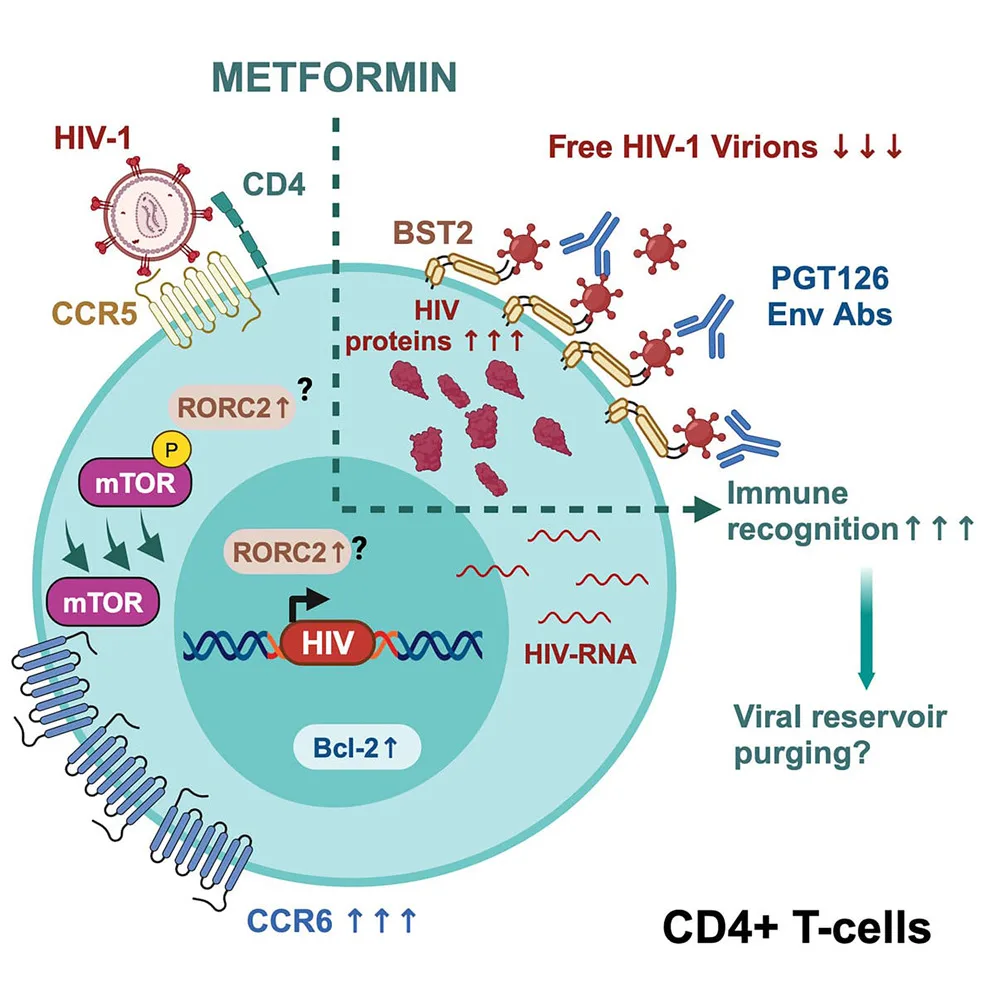
Credit: https://doi.org/10.1016/j.isci.2024.110670
The recent study on metformin, a drug typically used to treat type 2 diabetes, has sparked significant interest in its potential role in HIV treatment. Researchers have shown that metformin could help reactivate HIV reservoirs—hidden stores of the virus that evade antiretroviral therapy (ART). These reservoirs present a major challenge in curing HIV because they allow the virus to persist in patients even with treatment. The study, published in iScience, explored how metformin affects immune cells, particularly CD4+ T cells, which HIV often targets.
Antiretroviral therapy is highly effective in controlling HIV, reducing the virus to undetectable levels in the bloodstream. However, ART cannot eliminate the virus entirely because HIV reservoirs remain hidden in certain immune cells. These reservoirs act like viral “time bombs,” capable of reigniting infection if treatment is interrupted. Therefore, finding a way to target and reduce these reservoirs has been a critical goal in HIV research.
Metformin, it turns out, can enhance the visibility of these infected cells to the immune system. Specifically, it increases the expression of proteins such as BST2/tetherin, which inhibits the release of new viral particles and helps the immune system recognize infected cells more easily. This finding suggests that metformin might facilitate the immune system’s ability to locate and destroy these latent HIV reservoirs, a crucial step toward potentially reducing or eliminating the virus entirely.
Dr. Petronela Ancuta, one of the leading researchers, emphasized the significance of this discovery. She said, “Metformin’s ability to increase the recognition of HIV-infected cells by envelope antibodies offers a promising strategy to accelerate the decay of viral reservoirs.”
This discovery builds on prior research indicating that metformin can affect various stages of the HIV replication cycle. By targeting the mechanistic target of the rapamycin (mTOR) pathway, metformin helps reduce the virus’s ability to replicate and persist within cells. This pathway is crucial for cellular metabolism and immune function, and its suppression could limit HIV’s ability to hide in immune cells. The dual role of metformin, both preventing new infections and helping the immune system target existing ones, makes it a potentially powerful tool in HIV treatment.
One of the most promising aspects of the study is the potential to combine metformin with current ART and broadly neutralizing antibodies (bNAbs). This combination could help reduce or even eliminate the viral reservoir in patients, possibly leading to sustained remission of the virus without the need for lifelong treatment. Such an approach could revolutionize HIV therapy, as it aims to both suppress and eventually eradicate the virus.
Dr. Jonathan Richard, a co-author of the study, commented on the potential impact of this combination therapy. He stated, “By combining metformin with existing antibodies, we may be able to make significant strides in depleting the HIV reservoir, something that has been a key challenge in curing HIV.”
The study’s results suggest that metformin enhances the ability of the immune system to recognize HIV-infected cells, particularly through the use of bNAbs that can target the HIV envelope. This improvement in immune recognition could lead to more effective immune responses and the eventual destruction of infected cells. Furthermore, metformin’s role in increasing the expression of Bcl-2, a protein that promotes cell survival, might also help preserve the health of CD4+ T cells, which are crucial in fighting off infections, including HIV.
In this study, they also found that metformin influences the polarization of immune cells, particularly Th17 cells, which play an important role in immune responses. Th17 cells are highly susceptible to HIV infection, but maintaining their function is crucial for controlling the virus. Metformin was shown to support the polarization of these cells, which could further enhance the body’s ability to fight the infection.
This dual function of metformin—helping to reactivate hidden HIV and supporting immune cells—opens up exciting possibilities. By enhancing the visibility of the virus and supporting immune cells that fight infections, metformin could help shrink the viral reservoir, a long-sought goal in HIV research. The ability to safely “wake up” dormant viruses without causing harm is critical to this approach.
While the results of the study are promising, more research is needed to fully understand the mechanisms through which metformin affects HIV reservoirs and the immune system. Clinical trials are planned to explore the potential benefits of metformin in HIV-positive individuals undergoing ART. These trials will help determine the long-term effectiveness of metformin in reducing HIV reservoirs and improving patient outcomes.
Lead researcher Augustine Fert expressed optimism about the future of metformin as part of HIV treatment, stating, “This study opens up new possibilities for using metformin as an adjunct therapy to existing treatments, with the hope of not just controlling HIV but potentially curing it.”
Overall, the discovery that an inexpensive and widely available drug like metformin could play a role in HIV treatment is an exciting development. If further research confirms these findings, metformin could become a key component of future HIV therapies, helping to overcome the longstanding challenge of viral reservoirs. Researchers are hopeful that combining metformin with ART and bNAbs could lead to significant progress in the fight against HIV, ultimately bringing us closer to a cure.
Citation: Fert, A., Richard, J., Marchand, L. R., Planas, D., Routy, J. P., Chomont, N., Finzi, A., & Ancuta, P. (2024). Metformin facilitates viral reservoir reactivation and their recognition by anti-HIV-1 envelope antibodies. iScience, 27(9), 110670. https://doi.org/10.1016/j.isci.2024.110670

